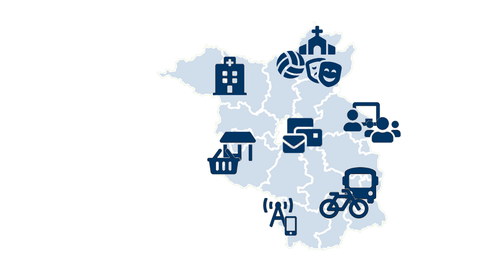Jun 01, 2022
How close is close enough? Services of general interest from the perspective of the citizens. Population survey starts in twelve municipalities in Brandenburg
What does it take for a good life? Is the supermarket in the next town and the baker's car sufficient for the basic supply of groceries? Which paths are reasonable for students? In rural areas, in particular, such questions of services of general interest are central issues for local politics and administration. The requirements the citizens have and what is particularly important to them are often neglected. Manfred Klaus, research associate at the Professorship for Land Management at the TU Dresden, wants to change that. In his research, he focuses explicitly on the residents' perspective.
"So far, the focus of science in the area of services of general interest has been almost exclusively on the state perspective," he observed. “In addition, current minimum standards in spatial and specialist planning are based on very old ideas, for example, that elementary school students can be expected to travel 45 minutes in one direction. Or there is no fixed minimum standard at all, such as in the food supply.”
For his doctorate, Manfred Klaus is now interviewing citizens from twelve Brandenburg communities. He wants to distribute 3,600 questionnaires at the beginning of June and is hoping for a large response. The state of Brandenburg is the ideal research field for him. “Brandenburg is very heterogeneous. The individual regions differ greatly in their structural strength, travel times to central locations, and population development.” Accordingly, he selected communities in all parts in order to get the most comprehensive picture possible. People in the medium-sized centers of Herzberg (Elster), Werder (Havel), Wittenberge, Prenzlau, Königs Wusterhausen and Spremberg as well as in the rural communities or offices of Röderland, Brück, Meyenburg, Gramzow, Spreenhagen and Welzow are surveyed.
Services of general interest mean the supply of goods and services that are necessary for a decent life and cover a wide range of topics. This includes the technical infrastructure such as water and energy supply, but also the social infrastructure such as health care, food supply, education and care, culture, civil protection, and mobility. In his research, Manfred Klaus focuses on the two aspects of school education and food supply. In a preliminary study, he has already conducted interviews with mayors, office directors, heads of primary schools, and local supply experts. In the main study, the population survey, he now wants to find out which facilities and services - e.g. elementary school, daycare center, pharmacy, family doctor - are considered necessary by local people. Another focus is on public transport such as buses and trains and acceptable travel times for students, but also for shopping or visiting the doctor.
The results of the study will be published and should help to better consider the needs of citizens in future planning. Households are selected at random and the survey lasts 10 to 20 minutes. Anyone who finds the invitation in their mailbox can respond online or by return letter. The more people participate, the more meaningful the study is.
Contact:
Manfred Klaus
Phone: +49 351 463-35637

